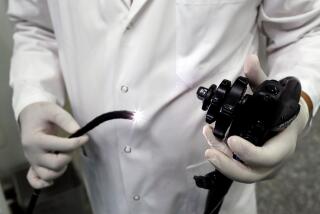Study Finds Questionable Benefits in Prostate Cancer Screening
- Share via
WASHINGTON — Screening for prostate cancer provides only uncertain benefits, a U.S. government panel found Monday, saying there was not enough evidence to recommend for or against men undergoing routine tests.
The report’s findings, based on a review of other studies of the effect of screening for the disease, the second-leading cancer killer of U.S. men after lung cancer, add to a growing debate on the subject.
“While the jury is still out on the value of routine screening to improve health outcomes, patients should talk with their clinicians to make individualized decisions,” Alfred Berg, head of the panel and chair of the University of Washington’s Department of Family Medicine, said in a statement.
“Men will need to make this decision based on their personal preferences and values until we have better scientific evidence on whether screening is effective.”
About 189,000 men will be affected by the disease in 2002 and 30,200 will die from it, according to the American Cancer Society.
But the latest report, by an independent task force sponsored by the Agency for Healthcare Research and Quality, echoes the findings of other researchers in October who questioned whether the benefit of screening outweighed its harms.
Men older than 50 are often advised to get a blood test that checks for the cancer by measuring the level of prostate specific antigen, a protein produced by prostate cells and especially by prostate cancer cells.
The so-called PSA test and another test called a digital rectal exam have been found to be effective at finding the cancer.
Adding to the debate over early screening, another study released Monday found that black men in the United States suffer and die from prostate cancer at higher rates than white men but could be cured just as easily as whites if the disease is caught and treated early.
“The good news is that when diagnosed early, prostate cancer is frequently curable in African Americans,” said William Barrett, lead investigator.
His study, released at the annual meeting of the Radiological Society of North America, compared 12 black patients with 161 whites, all of whom underwent a treatment in which radioactive seeds are implanted in the gland.
None of the black men experienced a recurrence of the cancer, although 5.6% of the whites did -- a difference that was statistically insignificant, it said.
The study said black men in the United States suffer from prostate cancer at a rate of 234.2 per 100,000 population compared to 144.6 per 100,000 for whites. The death rate for blacks is 53.1 per 100,000 compared to 22.4 for whites.
“There has long been debate about the usefulness of prostate cancer screening because some forms of the disease are slow growing and they will never be an issue for the patient,” said Barrett.
“But because prostate cancer in African Americans is generally not slow growing, the combination of early diagnosis and effective treatment should be particularly beneficial.”






